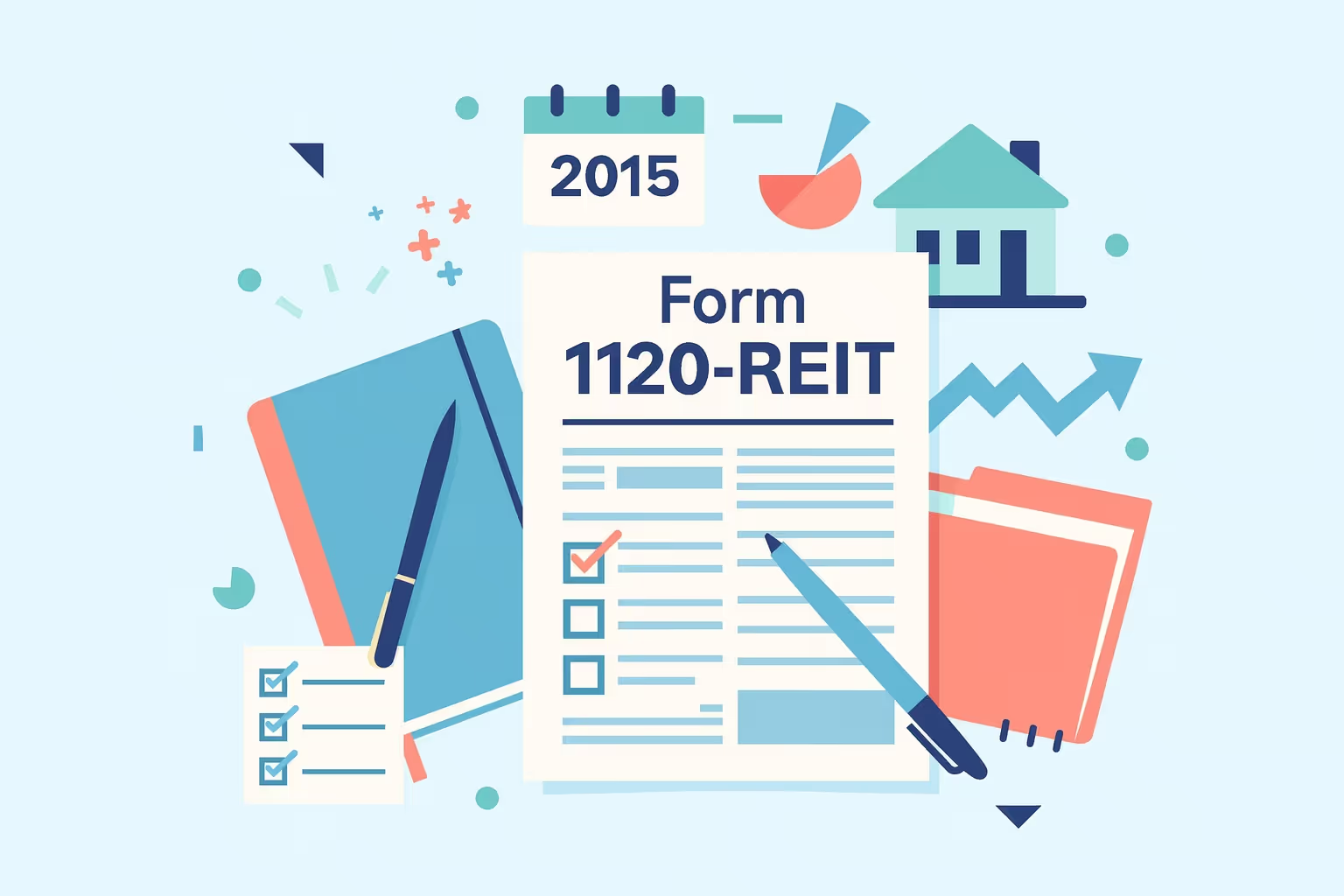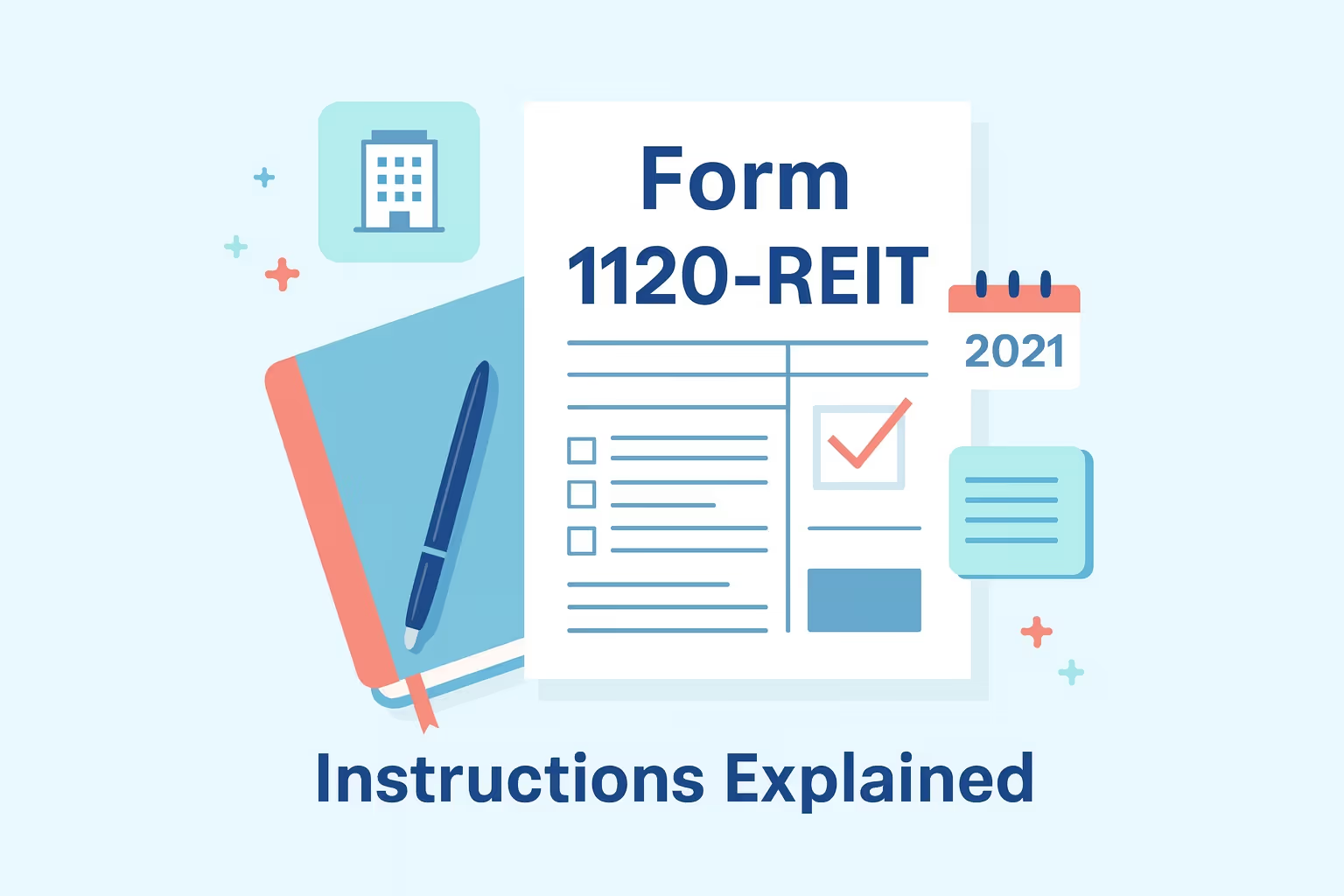
What IRS Form 1120-REIT (2024) Is For
IRS Form 1120-REIT (2024) is the income tax return used by real estate investment trusts to report their annual financial activity to the Internal Revenue Service. The form captures taxable income, deductions, credits, and distributions paid to shareholders. Any corporation, trust, or association that elects REIT status is required to file its return each tax year. The return helps the IRS confirm that the real estate investment trust met the required income and asset rules for continued qualification.
When You’d Use IRS Form 1120-REIT (2024)
You use IRS Form 1120-REIT (2024) when your real estate investment trust must file its annual income tax return for the 2024 tax year. A calendar-year REIT files by the April 15, 2025, due date, unless it follows an approved fiscal year. The form is also required when your organization needs to correct information reported in an earlier filing. Find instructions, business tax forms, and schedules you may need when preparing or correcting a 2024 Form 1120-REIT.
You should use Form 1120-REIT in the following situations:
- Annual filing for 2024: Your REIT must report taxable income, ordinary income, capital gains, REIT dividends, deductions, and other required details to the Internal Revenue Service.
- Late filing: You missed the original deadline or received an IRS notice about an unfiled tax return and still need to report that year’s results.
- Amended filing: You found errors that affect shareholder reporting, total assets, income calculations, or other items that influence compliance.
- Refund Claim: You are requesting a refund for 2024, filed within three years of the original due date or two years from the date the tax was paid.
Key Rules or Details for the 2024 Tax Year
For the 2024 tax year, the IRS requires every real estate investment trust filing IRS Form 1120-REIT (2024) to follow several rules to stay compliant with federal tax obligations. These rules help confirm that the REIT continues to qualify for its status and reports accurate information.
- Late-filing penalty: The IRS charges a minimum penalty when a return is filed more than 60 days after the due date. The amount is the smallest of the unpaid tax liabilities, or $510. See what the IRS requires when filing past-due corporate tax returns, including late or missing 1120-REIT filings.
- Income distribution requirement: REITs must distribute at least 90% of taxable income, which may include ordinary dividends, taxable interest, and capital gains taxes.
- Income and asset standards: REITs must meet the 75% and 95% gross income tests and limit taxable REIT subsidiaries to no more than 20% of total assets.
- Interest and payment rules: Interest starts on the April 15, 2025, due date, even when the REIT misses the timely filing or delays payments.
- Reporting details: The return must include an employer identification number, accurate account details, and information on REIT shares, retained earnings, and asset activity.
- Filing method: Most REITs are required to use paper filing, although some may be eligible to file electronically through approved IRS systems.
Step-by-Step (High Level)
1. Gather Records and Transcripts
Begin by gathering prior tax returns, IRS transcripts, and current financial statements. This includes detailed information on income from property, expenses, and distributions that are generally reported on a corporate income tax return.
2. Complete the 2024 Form 1120-REIT
Enter income, deductions, and taxation details for the current tax year. Confirm that both equity REITs and mortgage REITs are appropriately identified and that holding REITs are treated under the correct tax treatment.
3. Attach Required Schedules
Follow the general rule of supporting each line with schedules that show cost basis, gains, and how money moved through the business.
4. Mail or File the Return
Most REITs mail a paper return, but some may electronically file or e-file their returns. If a refund is due, you can request direct deposit to a savings account.
5. Keep Copies for Your Records
Retain signed forms, support for tax benefits, and workpapers prepared by any tax professional as an example of proper documentation for total assets and REIT shares.
Common Mistakes and How to Avoid Them
Errors on IRS Form 1120-REIT (2024) often slow down processing and create compliance issues for a company. The points below show common problems and explain how to prevent them:
- Incorrect dividend reporting: Occurs when distributions do not equal the required percentage of taxable income, making it more difficult for the IRS to determine whether the entity has met the rules under federal law. Reviewing payout totals before filing helps prevent this issue.
- Misclassified income: Income from rent, interest, or stock sales can be incorrectly categorized, which affects qualification tests. Matching each income type to the correct line on the form reduces these errors.
- Asset valuation problems: Inaccurate asset values result in incorrect totals and may lead to IRS follow-up. Reconciling year-end figures with accounting records helps ensure the accuracy and completeness of the financial records.
- Missing compensation details: Some REITs fail to include required wages, resulting in inconsistencies across schedules. Comparing payroll records to the return helps avoid omissions.
- Incomplete schedules: Missing applicable attachments cause delays, but using a filing checklist helps confirm that all schedules are included.
What Happens After You File
After you submit IRS Form 1120-REIT (2024), the IRS reviews the return to confirm that the real estate investment trust met its reporting requirements. Paper filings usually take several weeks to process, and late or complex returns may require additional manual review. The IRS may send notices requesting clarification or adjustments if there is a discrepancy between your records and its records. If the return shows a balance due, the REIT can set up a payment plan or respond to any follow-up requests in a timely manner. Understand how the IRS handles late or amended corporate filings and what triggers notices for REITs with reporting gaps.
FAQs
What penalties apply when real estate investment trusts file this income tax return late?
Late filing may result in penalties based on the unpaid tax and the duration of the delay. Interest continues until the balance is paid, and the IRS may issue notices if additional information is required. Learn how penalty relief works and when a REIT may qualify to reduce late-filing penalties for the 2024 tax year.
How do I get IRS transcripts to confirm taxable income and ordinary income for my return?
You can request transcripts online, by mail, or by phone. These records help confirm taxable income, prior adjustments, and reported ordinary income before completing the form.
Do I need to update my employer identification number if ownership changes during the year?
Most REITs maintain the same employer identification number; however, significant structural changes may necessitate the update of this information. The IRS instructions explain when updates are necessary.
How do capital gains and retained earnings affect this filing?
Both capital gains and retained earnings influence the calculation of distributions and overall reporting. These amounts must match internal accounting records and the schedules attached to the return.
What tax treatment applies to total assets held by the REIT?
The IRS reviews how total assets are categorized to confirm that the required percentages are met. Proper schedules help show compliance with income and asset tests.
Can I request a direct deposit refund for this income tax return?
Yes, if the return shows an overpayment, you may request direct deposit by providing accurate account information on the form.



































